Genius Electronic Optical Co (玉晶光), which supplies camera lenses for Apple Inc’s iPhones, yesterday said smart glasses are poised to become the next personal computing platform after smartphones, presenting a significant opportunity and a major challenge for companies producing lenses and optical products.
The company said camera lenses for handsets remain the core of its business.
Still, the increasing demand for lenses for virtual reality (VR) and augmented reality (AR) applications, as well as smart glasses, is expected to contribute to its revenue, it said.

Photo: David Chang, EPA-EFE
Genius is optimistic about the fourth quarter and expects its business to perform better than the same period last year, company chairman Jones Chen (陳天慶) told an online earnings conference.
As the fourth quarter is not a peak season for the industry, revenue is expected to be lower than in the third quarter, he said.
For next year, the company hopes for revenue and profit to surpass this year’s levels, given the rapid growth of smart glasses and deployment by AR customers, Chen said.
Genius’ revenue in the third quarter rose 62.06 percent quarter-on-quarter and 3.29 percent year-on-year to NT$7.74 billion (US$247.7 million) — the highest since the third quarter of 2023, the company said.
Cumulative revenue for the first three quarters of this year edged up 0.68 percent annually to NT$17.84 billion, it said.
Third-quarter net profit hit the highest in eight quarters at NT$1.42 billion, rising 488 percent quarterly and 2.6 percent annually, while total net profit in the first three quarters fell 27.3 percent year-on-year to NT$2.53 billion, the company said.
Genius earned NT$12.54 a share in the third quarter and NT$22.41 from January to September, it said.
Regarding trends in handset lenses, Genius president Lee Kuo (郭英理) referred to three aspects: smaller, thinner and wider-angle optimization.
The company’s main products remain handset lenses, while new areas such as those used in healthcare, retail, robotics and artificial intelligence (AI) devices are still in the experimentation phase, Kuo said.
The company would make adjustments in line with customers’ needs, he said.
The company entered the periscope lens supply chain this year, focusing on periscope lenses with 8x optical zooms, Kuo said.
Given market demand for higher magnifications such as 10x, 12x or even 16x, Genius would continue to develop these lenses in collaboration with customers, he said.
While the VR market has been weak recently, smart glasses have seen strong demand and are expanding from consumer entertainment to professional fields such as industry, education and healthcare on the back of rapid AI development, Chen said.
The intention of well-known brands to build their smart glasses ecosystems presents a significant opportunity for Genius, he said, citing the development of products such as imaging lenses, miniature projectors, prescription lenses and miniature motion-sensing lenses.
Regarding US tariffs, Chen said Genius does not ship products directly to the US, so Washington’s tariffs have no direct impact on the company, although they have an indirect effect.
As for exchange rates, the company adopts natural hedging strategies, trying to use the same currency for accounts receivable and payable, and primarily conducting purchases in US dollars, he said.
The company is still evaluating the need for overseas expansion and has not made a final decision yet, he added.

Nvidia Corp chief executive officer Jensen Huang (黃仁勳) on Monday introduced the company’s latest supercomputer platform, featuring six new chips made by Taiwan Semiconductor Manufacturing Co (TSMC, 台積電), saying that it is now “in full production.” “If Vera Rubin is going to be in time for this year, it must be in production by now, and so, today I can tell you that Vera Rubin is in full production,” Huang said during his keynote speech at CES in Las Vegas. The rollout of six concurrent chips for Vera Rubin — the company’s next-generation artificial intelligence (AI) computing platform — marks a strategic

REVENUE PERFORMANCE: Cloud and network products, and electronic components saw strong increases, while smart consumer electronics and computing products fell Hon Hai Precision Industry Co (鴻海精密) yesterday posted 26.51 percent quarterly growth in revenue for last quarter to NT$2.6 trillion (US$82.44 billion), the strongest on record for the period and above expectations, but the company forecast a slight revenue dip this quarter due to seasonal factors. On an annual basis, revenue last quarter grew 22.07 percent, the company said. Analysts on average estimated about NT$2.4 trillion increase. Hon Hai, which assembles servers for Nvidia Corp and iPhones for Apple Inc, is expanding its capacity in the US, adding artificial intelligence (AI) server production in Wisconsin and Texas, where it operates established campuses. This

US President Donald Trump on Friday blocked US photonics firm HieFo Corp’s US$3 million acquisition of assets in New Jersey-based aerospace and defense specialist Emcore Corp, citing national security and China-related concerns. In an order released by the White House, Trump said HieFo was “controlled by a citizen of the People’s Republic of China” and that its 2024 acquisition of Emcore’s businesses led the US president to believe that it might “take action that threatens to impair the national security of the United States.” The order did not name the person or detail Trump’s concerns. “The Transaction is hereby prohibited,”

Garment maker Makalot Industrial Co (聚陽) yesterday reported lower-than-expected fourth-quarter revenue of NT$7.93 billion (US$251.44 million), down 9.48 percent from NT$8.76 billion a year earlier. On a quarterly basis, revenue fell 10.83 percent from NT$8.89 billion, company data showed. The figure was also lower than market expectations of NT$8.05 billion, according to data compiled by Yuanta Securities Investment and Consulting Co (元大投顧), which had projected NT$8.22 billion. Makalot’s revenue this quarter would likely increase by a mid-teens percentage as the industry is entering its high season, Yuanta said. Overall, Makalot’s revenue last year totaled NT$34.43 billion, down 3.08 percent from its record NT$35.52